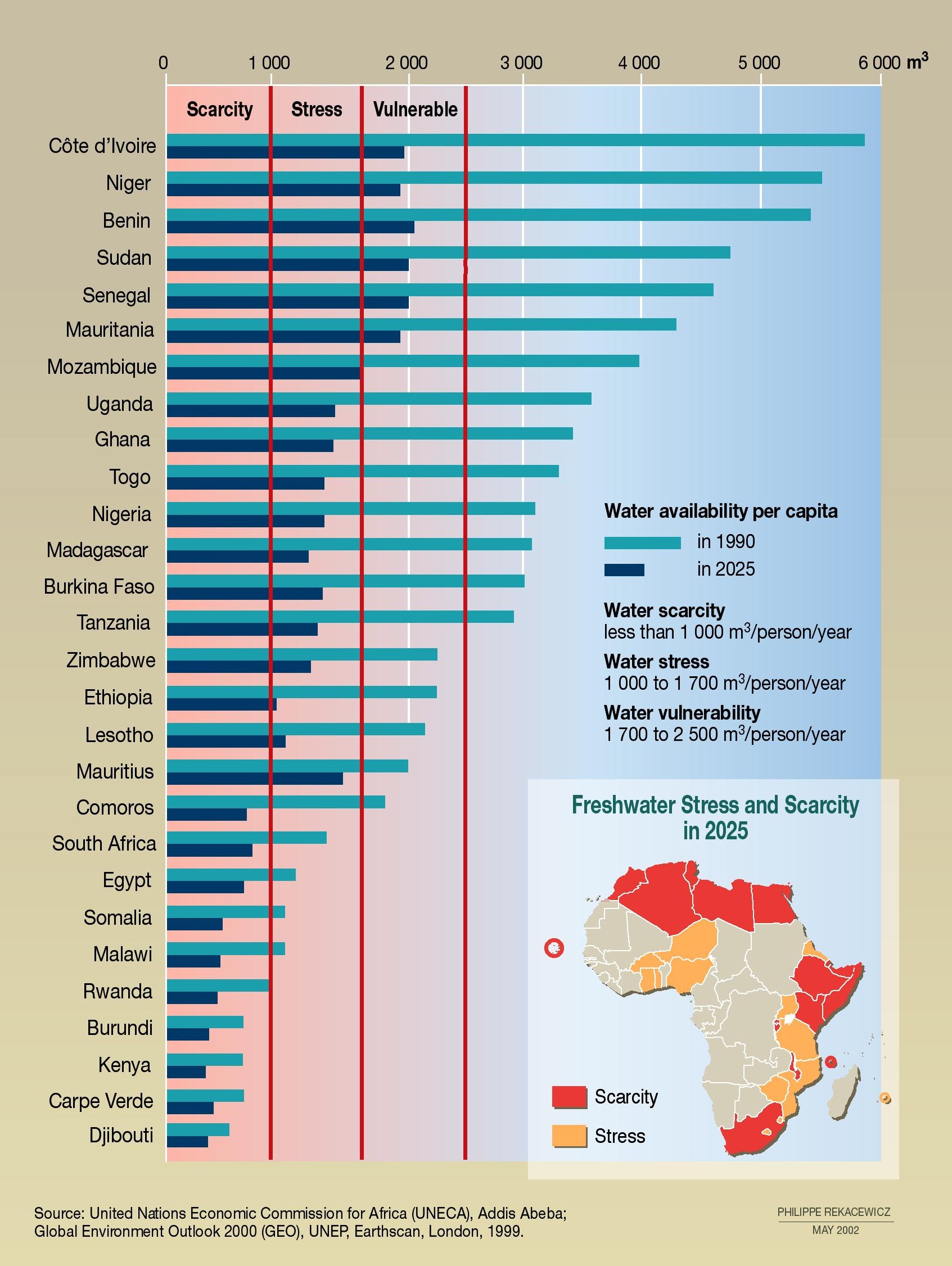So firstly, hydropolitics is important because it’s all about water (obviously)!
‘No life as we know it is possible without the simple but remarkably versatile molecule H2O, water'
‘No life as we know it is possible without the simple but remarkably versatile molecule H2O, water'
Water is not just essential for sustaining life but also for its development. As mentioned by C.A. Mumma Mortinon (2010), waterways are vital for ‘trade, recreation, fishing, industry, agriculture, communication, tourism, culture and settlements’ and is a basic human right (Kofi Annan, 2001).
The wide variety of water usage and sheer volume of water consumption as well as growing populations result in a rising demand for freshwater and thus issues with supplying that demand.
Moreover, many sites of freshwater sources have become sites of contention as they are shared by multiple nations and users. In fact half of the Earth’s land surface is covered by 263 transboundary lakes and river basins (UN). The figure below shows the number of internationally shared basins in Africa and highlights why the issues of hydropolitics are important to the continent.
 |
| International River Basins in Africa (source:UN,TFDD) |
Elhance 's (1997) definition of hydropolitics (mentioned in the first post) looks at hydropolitics in terms of conflict and cooperation in international basins and sees the state as the main actor. However Meissner's (1999) definition of hydropolitics considers how different stakeholders (state, non-state, those outside and within the state) share national and international water resources. It also looks at the sovereignty over water and the authoritative allocation of water. Now whilst both these definitions look at an authoritative system of water allocation, it is increasingly recognised that hydropolitics involves: a range of actors working at different scales, requires decision making on the allocation of water which leads to trade-offs, most decisions lead to some contention and that water allocations need to consider a range of issues (social, food security, political, ecological, gender etc) (Turton, 2002).
On the whole hydropolitics aims to understand how water can be shared in a equitable and sustainable manner in order to avoid a state of water scarcity.
This index produced by Falkenmark (1989) compiled data on water usage from multiple nations to produce a series of figures that indicate the water conditions of a country in terms of water usage per person.
The research suggested that a figure of 1700cm3 per capita water usage was a sufficient amount of water whilst an amount lower than that indicated a region facing water stress. A per capita usage of below 1000cm3 suggests a situation of water scarcity and a figure below 500cm3 a region facing absolute water scarcity.
The graph below shows that by 2025 no nation in sub-Saharan Africa will have above sufficient access to water and most countries will be facing a situation of water scarcity and stress. Thus to prevent water shortages leading to conflict and water wars it is imperative to come to agreements and resolutions on how to share water.
 |
| Water Scarcity in Africa (source: UNEP) |
One way water may be shared is through the allocation of water rights. Water rights may be informal or formal and the allocation of water rights can be another source of conflict. They are defined as the 'demands to use a flow of water, including privileges, restrictions, obligations and sanctions where it is key to make collective decisions on management (Beccar et al., 2002). Water rights go hand in hand with management where cooperation is needed for the efficient use of water. However, reaching agreements on water allocations can be difficult as stakeholders make different claims for shared water. This could include: local communities seeing water as a common property, traditional water rights, privatised water and water for markets, riparian, riverine and both internal and external sovereignty (Green Cross, 2000).
Therefore, water rights work at various scales and allocations are usually indicative of the power structures between and within nations. So to reduce disputes over water and prevent a 'tragedy of the commons', governance over allocations and management schemes need to cooperate with both local communities and different stakeholders to ensure a stable water supply for the future (UNESCO, 2006).
Several treaties and regulations have been drawn up by various organisations to help make sharing water resources more equitable but like all agreements trade-offs have to be made and these can often lead to conflicts. Conflicts which may only be exacerbated by rising demand and climate change. But more on the different agreements later (something to look forward to I'm sure!).
This post hopefully gave you a brief insight into the sort of issues and aims hydropolitics tries to address as well as a very brief introduction into the concepts of water scarcity and water rights. The rest of the posts will mainly deal with the different resolutions and claims countries make for water resources and will focus on nations in Africa where millions of people rely on water from shared river basins and, where a rising population and changing climate pose a serious risk to water security.
Hi Vasu! A great overview of some key issues in the hydropolitics of water resources! I think this issue is especially important in Africa due to the sheer volume of shared river basins as illustrated through the first figure. My own blog focuses on the impacts of and adaptations to climate change on water resources in Africa - I was wondering whether under the current projected changes of reduced frequency of medium intensity events and increased likelihood of droughts, you think that international conflicts over water resources will become even more acute? I feel climate change and the hydropolitics of water resources are highly intersecting planes of study - would you agree?
ReplyDelete